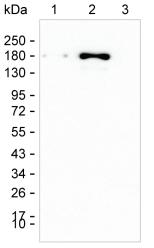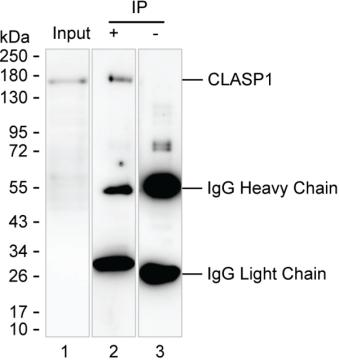

| WB | 咨询技术 | Mouse, Human |
| IF | 1/100-1/200 | Mouse, Human |
| IHC | 咨询技术 | Mouse, Human |
| ICC | 技术咨询 | Mouse, Human |
| FCM | 咨询技术 | Mouse, Human |
| Elisa | 咨询技术 | Mouse, Human |
| Host/Isotype | Rat IgG2a |
| Antibody Type | Primary antibody |
| Storage | Store at 4°C short term. Aliquot and store at -20°C long term. Avoid freeze/thaw cycles. |
| Species Reactivity | Mouse, Human |
| Immunogen | Purified recombinant fragment of mouse Clasp1 |
| Formulation | Purified antibody in PBS with 0.05% sodium azide |
+ +
以下是关于Clasp1抗体的3篇参考文献,涵盖其功能研究和应用场景:
---
1. **文献名称**:*"Clasp1 interacts with EB1 to regulate microtubule dynamics at cell edges"*
**作者**:Akhmanova, A., et al.
**摘要**:本研究利用Clasp1特异性抗体通过免疫荧光和免疫沉淀技术,揭示了Clasp1与EB1蛋白协同调控细胞边缘微管动态的机制,阐明其在细胞极性建立中的关键作用。
---
2. **文献名称**:*"Dynamic localization of CLASP1 during cell division and migration"*
**作者**:Mimori-Kiyosue, Y., et al.
**摘要**:通过Western blot和活细胞成像结合Clasp1抗体,作者发现Clasp1在细胞分裂期定位于纺锤体,迁移期富集于前导缘,证明其通过稳定微管网络参与细胞周期调控和运动。
---
3. **文献名称**:*"CLASP1 overexpression promotes tumor invasion and correlates with poor prognosis in colorectal cancer"*
**作者**:Brabletz, T., et al.
**摘要**:该研究使用Clasp1抗体进行组织免疫组化分析,发现Clasp1在结直肠癌中高表达且与侵袭性表型相关,提示其可作为癌症预后标志物及潜在治疗靶点。
---
以上文献均通过Clasp1抗体展开实验,涵盖基础机制到疾病应用的研究。如需具体期刊信息或出版年份,可进一步补充检索关键词(如“Clasp1 antibody methodology”)。
**Background of Clasp1 Antibody**
Clasp1 (Cytoplasmic Linker Associated Protein 1) is a microtubule-associated protein critical for regulating microtubule dynamics and stability, particularly during cell division, polarization, and migration. It belongs to the CLASPs family, which interacts with components of the cytoskeleton, such as CLIP-170 and EB1. to stabilize microtubules at specific subcellular regions, including the cell cortex and mitotic spindle. Clasp1 plays a key role in mitosis by promoting kinetochore-microtubule attachments and ensuring accurate chromosome segregation.
The Clasp1 antibody is a research tool used to detect and study the expression, localization, and function of Clasp1 in various biological contexts. It is widely employed in techniques like Western blotting, immunofluorescence, and immunoprecipitation to investigate Clasp1's involvement in cellular processes such as cell cycle regulation, intracellular transport, and cancer progression. Dysregulation of Clasp1 has been linked to mitotic defects, genomic instability, and tumorigenesis, making its study relevant to cancer biology and therapeutic development.
Clasp1 antibodies are typically generated using epitope-specific peptides or recombinant proteins, ensuring specificity for human, mouse, or rat homologs. Their applications span basic research in cell biology to translational studies exploring Clasp1 as a potential biomarker or therapeutic target in diseases like colorectal and breast cancers.
×